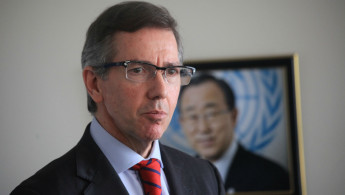UN Libya envoy accepts £1000-a-day job in UAE
The UN's special representative in Libya has accepted a $1500 a day job with the UAE, which backs one side in the Libyan civil war that he was trying to end, reported the UK's Guardian today.
Bernadino Leon was reportedly offered the job as director general of the UAE's diplomatic academy in June and has spent the summer negotiating the position.
The UAE announced Leon's new position on 4 November, and a German diplomat, Martin Kober will succeed him at the UN when he finishes his role on 6 November.
The diplomatic academy is a state backed think tank that promotes the UAE's foreign policy and strategic relations, and trains its diplomats.
Leon's new job raises questions about his impartiality as the UN's chief peacemaker in Libya.
Analysts argue the war in Libya has been turned into a proxy war, with Egypt and the UAE using it to fight against Islamists backed by Turkey and Qatar.
Libya's rival factions remain deadlocked over plans for a national unity government, with the Islamist-backed national assembly called the General National Congress, versus the House of Representatives - the elected parliament.
The Spanish diplomat denies any conflict of interest saying he wanted to leave his role at the UN by 1 September.
| Leon's new job raises questions about his impartiality as the UN's chief peacemaker in Libya. |
"The only defence I have against these attacks is my work," he wrote in an email to the Guardian. "As I said before, read my proposals, the agreement and the government proposal. It has been considered by the Libyans from both camps as a fair proposal."
However, five months after he was appointed to his position in Libya on 31 December 2014 he sent an email to the UAE's foreign minister, Sheikh Abdullah bin Zayed, from his personal account, reported the Guardian.
"In it he tells the UAE that, because of the slow progress of peace talks, Europe and the US were asking for a 'plan B … a classical peace conference ... This is, in my opinion, a worse option than a political dialogue … because it will treat both sides as equal actors,'" said the Guardian.
Reportedly, he went on to say that his plan was to "break a very dangerous alliance" between the wealthy merchants of Misrata and the Islamists that keeps the GNC afloat.
According to the Guardian he said he wanted to reinforce the HOR, the body backed by the UAE and Egypt:
"He states bluntly that he is 'not working on a political plan that will include everybody' and talks of having a strategy to 'completely delegitimise' the GNC.
"He admits 'all my movements and proposals have been consulted with [and in many cases designed by] the HOR and [Libya's ambassador to the UAE] Aref Nayed and [the UAE-based former Libyan prime minister] Mahmud Jibril'.
"In signing off, Leon tells the UAE's foreign minister: 'I can help and control the process while I am there. However, as you know I am not planning to stay for a long time … I am seen as biased in favour of HOR. I advised the US, UK and EU to work with you,'" reported the Guardian.
Leon reportedly emailed the Guardian to say he was not biased and had "many similar communications with other countries supporting the other Libyan camp, in a similar spirit. I'm sure in different occasions I also told them that they can 'count on me'. My job is to build trust with all of them, inside and outside Libya".
Leon's role in Libya, however, has been seen as a minor success by analysts.
The diplomat says his emails have been misrepresented and offer a selective view of his position.





 Follow the Middle East's top stories in English at The New Arab on Google News
Follow the Middle East's top stories in English at The New Arab on Google News
![Both Hamas and the Palestinian Authority welcomed the ICC arrest warrants [Getty]](/sites/default/files/styles/image_330x185/public/2024-11/GettyImages-2178351173.jpg?h=199d8c1f&itok=TV858iVg)

